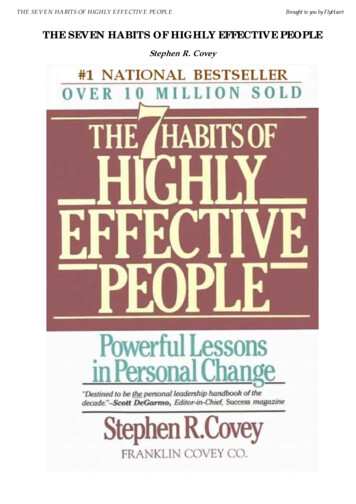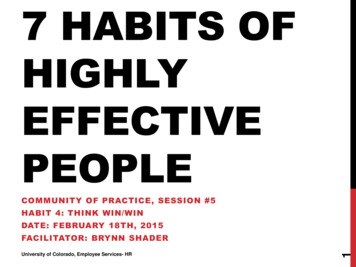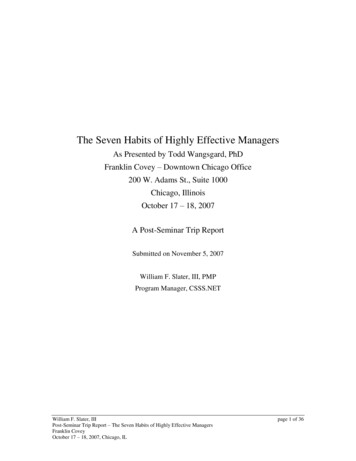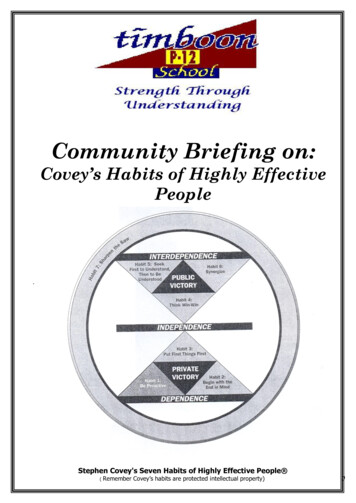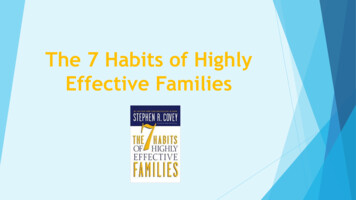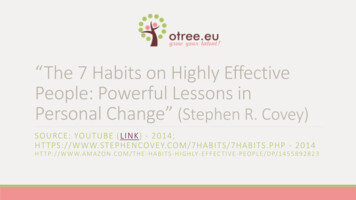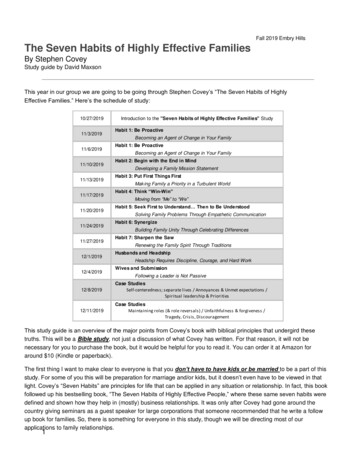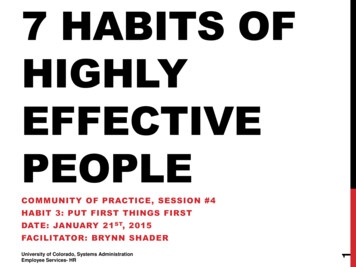
Transcription
7 HABITS OFHIGHLYEFFECTIVEPEOPLECOMMUNITY OF PRACTICE, SESSION #4HABIT 3: PUT FIRST THINGS FIRSTDATE: JANUARY 21 ST, 2015University of Colorado, Systems AdministrationEmployee Services- HR1FACILITATOR: BRYNN SHADER
How does what you do roll up into and align with CU’s ultimate Mission, Guiding Principlesand Vision? Which values and principles do you put into practice within your role?University of Colorado, Systems Administration EmployeeServices- HR2CU MISSION STATEMENT
HABIT 3: PUT FIRSTTHINGS FIRSTAgenda Self-Management Time Management Matrix- Quadrant II Exploration & Discussion 7 Big Rocks Saying “No” Contemplation DelegationUniversity of Colorado, Systems Administration EmployeeServices- HR3 Exploration & Discussion Homework
HABIT 3: LIVE THEPROGRAMHabit 1: You are the programmer!Habit 2: Write the programHabit 3: Live the programUniversity of Colorado, Systems Administration EmployeeServices- HR4
INDEPENDENT WILLHabit 3 requires we exercise our Independent Will, whichmeans: Act versus be acted upon Proactivity instead of reactivity Use our values over our emotions/momentary desiresWe can measure this with our Personal Integrity, which is:University of Colorado, Systems Administration EmployeeServices- HR5 The value we place on ourselves
SELF-MANAGEMENTLeadership versus Management? Leadership Determining What the “First Things” Are Management First Things First- Carrying it outWhat is Self-Management? Left brain Breaking down Analysis Sequencing Specific application Time-bound DisciplineUniversity of Colorado, Systems Administration EmployeeServices- HR6 What is Discipline?Being a “disciple” of your own deep values and their sourceBeing able to say “No!”
TIME MANAGEMENTMATRIXAn activity can be either urgent or important: Urgent requires immediate attention/reactivity Important is about achieving results/proactivityThe Quadrants Quadrant I consumes many peopleSource: www.lifecoachusa.com Our effectiveness takes quantum leaps when we do theactivities in Quadrant II “Effective people are not problem-minded, they are opportunityminded”- Peter DruckerExample- Shopping center/tenantsUniversity of Colorado, Systems Administration EmployeeServices- HR7
QUADRANTS ACTIVITY – PART IWhere do you spend your time?1.Fill out the box next to each quadrant with the approximate amount oftime you spend in each per WEEK1.How do you feel about your current distributionof time?2.What would you like your percentages to be?3.What would you like to change about how youmanage your time?University of Colorado, Systems Administration EmployeeServices- HR8Questions to think about:
University of Colorado, Systems Administration EmployeeServices- HR9QUADRANT I:URGENT, IMPORTANT
University of Colorado, Systems Administration EmployeeServices- HR10QUADRANT III:URGENT, NOT IMPORTANT
University of Colorado, Systems Administration EmployeeServices- HR11QUADRANT III & IV:NOT IMPORTANT
University of Colorado, Systems Administration EmployeeServices- HR12QUADRANT II:NOT URGENT, IMPORTANT
QUADRANT II6 Key Criteria of Quadrant II1. Coherence2. Balance3. Quadrant II Focus4. “People” Dimension5. FlexibilityUniversity of Colorado, Systems Administration EmployeeServices- HR136. Portability
QUADRANT II:4 KEY ACTIVITIES1. Identifying Roles2. Selecting Goals3. SchedulingUniversity of Colorado, Systems Administration EmployeeServices- HR143. Daily Adapting
7 BIG ROCKS – THEPRODUCTIVITY SYSTEMUniversity of Colorado, Systems Administration EmployeeServices- HR15http://youtu.be/fmV0gXpXwDU
QUADRANTS ACTIVITY – PART IIWhat are your 7 big rocks of productivity?1. Take 5 minutes to think about 5-7 roles you play in your life2. Think about the primary goals you’re dealing with now, andcome up with 1 goal for each roleUniversity of Colorado, Systems Administration EmployeeServices- HR16In order to reach your professional goals, you may need tosay NO and DELEGATE .
SAYING “NO” Must take time from Quadrants III and IV to create II Can’t ignore Quadrant I - urgent, but it will shrink in size Say “Yes” to priorities, and “No” to other things (which mayat times seem urgent)DiscussCan you think of a time when you’ve said no in your personal orprofessional life and it had positive results? Why did you say no? What were the positive results?University of Colorado, Systems Administration EmployeeServices- HR17 What would have happened if you didn’t say no?
DELEGATIONDelegation is the single-most powerful high-leverage activity there isTwo Types of Delegation1) Gofer- One-on-one supervision (Authoritarian)2) Stewardship (Authoritative)Focus is on results rather than methodsThe individual becomes their own boss/stewardThey determine their own methodsResponsible for their own resultsUniversity of Colorado, Systems Administration EmployeeServices- HR18
STEWARDSHIPDELEGATION*Trust is the highest form of human motivation*5 Expectations of Stewardship Delegation1. Desired ResultsWhat, not how; Results, not methods2. GuidelinesParameters within which individual operates/restrictions; Identify where quicksandand wild animals are; What NOT to do3. ResourcesHuman, financial, technical, organizational they can pull from4. AccountabilityStandards of performance that will be evaluated5. ConsequencesUniversity of Colorado, Systems Administration EmployeeServices- HR19What will happen (good and bad) as a result of evaluation
DELEGATION: ACTIVITYThink of a time when you delegated or were delegated to in goferand stewardship styles:As an Employee: How did your feelings and reactions change when you were delegated to in a goferfashion versus Stewardship? What would you have changed about your supervisor’s approach? How does your delegation style affect the dynamic between your employee andyou? What are the risks with each approach, and what are the benefits? Which style are you more inclined towards? What would you like to change abouthow you delegate?University of Colorado, Systems Administration EmployeeServices- HR20As a Supervisor:
WRAP UPThe concepts we covered today: Self-Management Time Management Matrix- Quadrant II Saying “No” DelegationUniversity of Colorado, Systems Administration EmployeeServices- HR21What tools can you put into practice when you walk out thatdoor?
University of Colorado, Systems Administration EmployeeServices- HR22BIG PICTUREREMINDER
HOMEWORK1. Fill out Weekly Schedule handout (or your own version)University of Colorado, Systems Administration EmployeeServices- HR23Come to the next session ready to discuss your experience2. Read Habit 4: Think Win/Win
What are your 7 big rocks of productivity? 1. Take 5 minutes to think about 5-7 roles you play in your life 2. Think about the primary goals you’re dealing with now, and come up with 1 goal for each role In order to reach your professional goals, you may need to say NO and DELEGATE . University of Colorado, Systems Administration Employee
